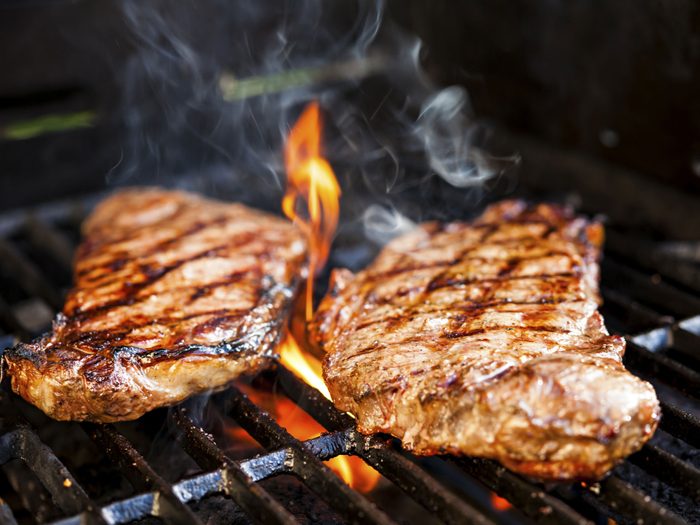
Where There’s Smoke, There’s Cancer Risk
Grilling meat, poultry, or fish, whether over wood, charcoal, or gas, exposes us two separate carcinogens (cancer-causing agents).
Polycyclic aromatic hydrocarbons (PAHs) are found in the smoke created when fat drips from meat, chicken skin, or fatty fish (such as salmon) onto a heat source. The PAH-filled smoke rises and coats the food, which we then ingest.
The second type of carcinogen, heterocyclic amines (HCAs), develops in meat, poultry, or fish that is cooked over high heat. Extreme temperatures prompt a reaction between the food’s natural amino acids and creatine, a naturally occurring substance in muscle tissue-and the result is carcinogenic. HCAs can also form in foods that are broiled, especially well-done red meat.
Researchers have found that people who eat their beef well done are more than three times as likely to develop cancer as those who prefer their steaks medium-rare or rare.
Don’t despair. The good news is that if you take a few precautions, you can enjoy the fun and food of outdoor cooking and stay healthy, too.
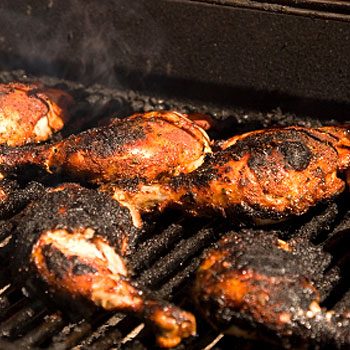
Stay Clear of Burned Steer
This simple change may be the most difficult to make for fans of charred steaks, hamburgers, and chicken. At the very least, eat well-done meat sparingly. (While avoiding extremes, you’ll still want to cook meat completely, to make sure you eliminate illness-causing bacteria like E. coli.)
The latest nutrition research has identified several new approaches to cooking on a barbecue. This follows on from evidence that has started to build in the last few years linking blackening or charring food with health risks.
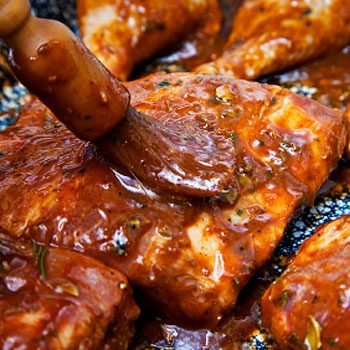
Secret of Marinade
Marinades not only make grilled foods taste better, they may also make them safer. A chemist at the Lawrence Livermore National Laboratory in California found that marinating chicken in simple mixture of olive oil, cider vinegar, garlic, mustard, lemon juice, salt, and brown sugar reduced carcinogenic compounds in the finished product by more than 90 percent. Researchers don’t know why; they suspect that marinating draws out chemical precursors of carcinogens.
The only caveat is to treat marinades, which draw bacteria from meat and poultry, as a raw food. To use a marinade as a serving sauce, set aside a portion before you place the meat in it or boil it for three minutes before serving.
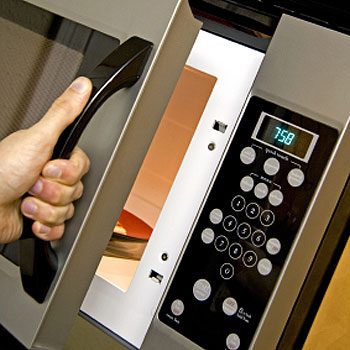
Cook Before You Hit the Grill
Precook the meat in a microwave oven for two minutes and drain off the liquid before barbecuing. Meats which are partially cooked in the microwave first cook with lower levels of unhealthy compounds called heterocyclic amines (HCAs). Be careful not to microwave meat for too long, though, or it will become tough.
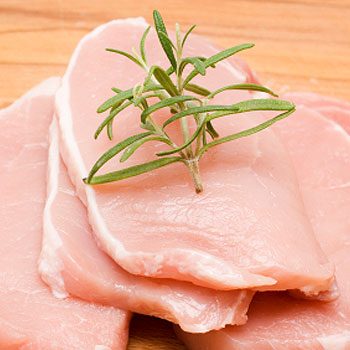
Cut the Fat
Use thinner slices of meat – they cook quicker and with less heat. Trimming all visible fat, or using lean cuts, will help avoid flame-ups (and bad cholesterol). Removing the skin from chicken will alo reduced the carcinogens.
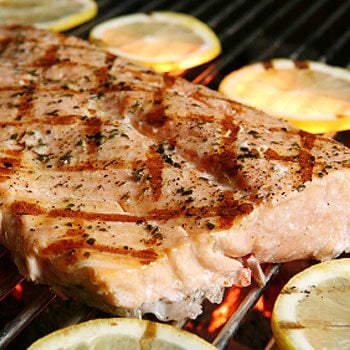
Cut the Meat
Try grilling fish instead since it contains less fat, which makes it less likely to create PAH-carrying smoke. And it tends to require much less time on the grill, reducing its exposure to carcinogens. Try some recipes of grilled vegetable kebab for something different.
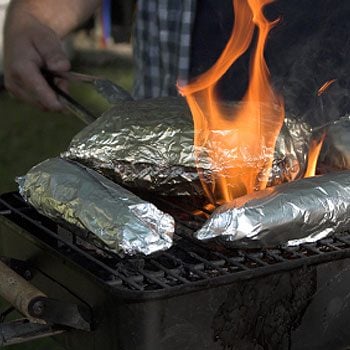
Lower the Heat
Barbecue at low temperatures and don’t let the meat sizzle too much. On charcoal grills, increase the distance between the food and the hot coals by spreading the coals thin or by propping the grill rack on bricks. On gas grills, simply adjust the heat setting.
Use aluminum foil. Make tiny holes in a piece of foil and place it on the grill underneath your meat. The holes let the fat drip down, and the foil reduces the amount of smoke the billows back up. Wrapping the meat completely with perforated foil is an even better idea.
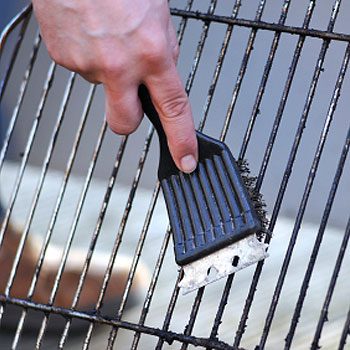
Maintain Your Grill
Oil your grill to keep charred material from sticking to the food. Scrub your grill thoroughly after every use to avoid a buildup of carcinogens that can be transferred to your food the next time you grill. BBQ briquettes and hardwood products, such as hickory and maple, burn at lower temperatures than softwood and softwood (pine) chips. Mesquite chips are slightly less safe than those made of other hardwoods but are safer than softwoods.